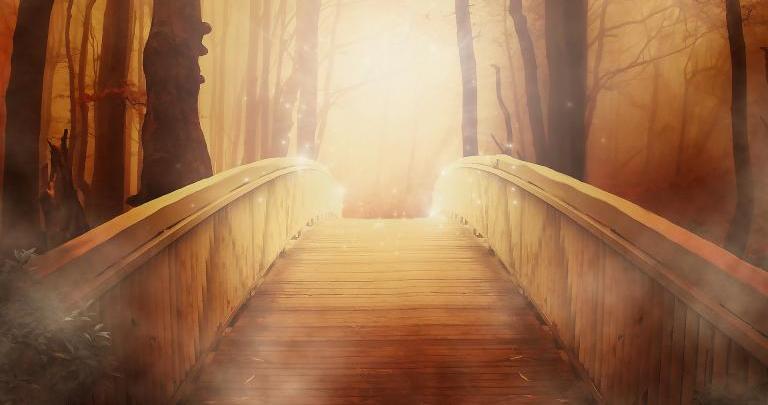
Not too long ago a question like this would have made the hairs on the back of my neck stand on end. My defences would have sprung up, rendering me virtually incapable of rational thought or open conversation.
The reason for this fairly extreme reaction is that until recently, the existence of an afterlife was central to how I interpreted the world around me. The centrality of this belief meant that any opinion to the contrary was met with low-level hostility, because of the perceived threat it posed to the comfort and stability of my worldview. This anxiety and hostility didn’t fit with my understanding of Christianity, so I knew something had to change.
I don’t think the belief itself was a problem (I still hold some sort of belief now), but my white-knuckled grip of it most definitely was. Some people are content not to know, but I needed it to be true. My entire worldview was dependent upon the existence of some sort of life beyond death, and I was desperate to remain convinced. I had to believe in some sort of greater story; a culmination; a happy ending that would finally make sense of all our human struggles. I engaged in intellectual wrestling matches with myself and others, fighting to maintain some sort of grasp on the deepest and most unfathomable mysteries. True to my evangelical Christian upbringing, I believed I could understand these things if I thought hard enough about them. I had been taught that I had access to the bigger picture; that I could know how the story began and how it would end.
A couple of years ago I began to see how unhealthy the way I believed had become. Clinging to my belief in the afterlife was taking up far too much emotional energy. I had to find a way to let go and stop caring so much about something I had absolutely zero control over.
Let me backtrack for a moment and explain some of the eschatological meanderings that brought me to this point. Growing up in church, I was taught that I should have full confidence in a very particular vision of the afterlife: that is, heaven and hell. I saw this life as a prequel to the real thing, and I knew that I would experience a blissful eternity, provided I held the correct beliefs.
As I started to question this belief framework, I was introduced to some beautiful ideas that were new to me but had long been embedded within orthodox Christianity. These ideas saved my faith at this point by giving me alternative beliefs to hold onto. I stopped believing in any real concept of hell, and began to understand the afterlife as the Kingdom of God coming to earth in the beautiful, climactic culmination of all things. This is the vision of an afterlife that I found myself clinging to. It really is a magnificent way of seeing reality. It provides endless comfort and hope as well as a thirst for justice and a motivation to work towards a better future.
While I still love these Christian ideas of heaven and resurrection, I now try to hold them as hopes or possibilities, rather than fixed beliefs. As a natural overthinker I find this very difficult, so to prevent myself spiralling down into mental rabbit holes I often have to actively avoid thinking about these things at all. If I dwell on imagined scenarios for any length of time I start to feel my fists clenching again, so I just don’t go there. Instead, I try to focus as fully as possible on the here and now, living out my Christian faith in this present reality without giving too much thought to what may or may not lie beyond. I remind myself to let go of the illusion of certainty and accept that as a mere human I don’t get the privilege of a God’s-eye view. This might not fit with the assuredness of Paul and the gospel writers, but certainty in these matters simply isn’t something we can claim – as much as we might like to. (The writer of Ecclesiastes would agree with me there).
Is belief in the afterlife good for humanity?
Since I stopped asking (with hindsight, fairly ridiculous) questions like “how can I be sure heaven is real?”, I have started to wonder about the effects of belief in the afterlife on humans in general. For something we can never possibly know about for sure, people hold some very strong views on it – views that sometimes lead to extreme life choices.
Judging by global statistics of religious affiliation, it appears that most people in the world still hold some sort of belief in the afterlife. A 2014 study found that 72% of Americans believe in heaven, and even in the UK (reported to be one of the least religious countries in the world) 46% of people interviewed in a 2017 BBC poll professed a belief in the afterlife.
We see examples almost daily of how strong beliefs in particular versions of the afterlife can lead to violence, bigotry and hatred, often on a terrifying scale. Within Christianity we see how believing in certain doctrines of the afterlife can lead to neglect and in some extreme cases even wilful destruction of our planet and the many forms of life that depend upon it. Not to mention the church’s long history of using the promise of heaven (and more effectively, the fear of hell) to achieve mass control and manipulation.
I’ve seen a number of Brits and Americans reacting against this “bad religion” by asserting the opposite belief – that this life is definitely all there is. The Sunday Assembly– a global movement of secular congregations – claims to be radically inclusive and have no doctrine, and yet the first point of its charter states confidently: “We are born from nothing and go to nothing”.
Like many others, I find myself floating somewhere in the middle of these two positions. I can see how having strong beliefs in the afterlife can be, in some ways, terrible for humanity. I sometimes wonder if the comfort and assurance from my belief in an ultimate “happy ending” has cushioned me from the reality of serious global issues such as climate change, making me less motivated to make drastic changes. Even if my Christian doctrines encourage me to work for social justice, am I really going to be mobilised to act if I ultimately believe everything will somehow sort itself out?
However, having spent most of my life immersed in Christianity and its promise of an ultimate hope, the prospect of nothing isn’t too attractive either. The thought that this is it still appals me if I think about for long enough. Not because my life isn’t full and rewarding, but because I can’t stand the idea that all human striving and suffering has no ultimate significance beyond this life. I can’t stand the idea that someone can be born, suffer constantly, and die – for whatever reason, my brain refuses to find that an acceptable view of reality.
If everyone on the planet stopped believing in the afterlife tomorrow, would we all become better, happier, more altruistic people? In truth I have no idea, but I would suspect not. There is something about the minds of humans that prevents us from easily accepting our own mortality and that of those we love.
Clearly, the effects of a belief in the afterlife depends greatly on what exactly that belief is. If you believe in a real threat of hell you may live a life of fear (from this point of view the idea of no afterlife at all would seem a wonderful prospect), whereas if you have full confidence in a glorious redemption where love triumphs over all, your life will be full of hope for the future. As with most religious belief (and other beliefs for that matter), belief in an afterlife can become harmful when the assumption is made that everyone should agree. Authoritarianism in religion invariably leads to abuse and suffering in some form or another.
In my own life, holding on to beliefs too tightly was breeding hostility towards those whom I wished would see things as I did. Yet despite various dangers, I still think afterlife belief can be a good thing. We all have different personalities, experiences and needs, and I am certain that for many people, belief in an afterlife reduces suffering and enhances the experience of this life. That said, it never hurts to examine our own beliefs and the unseen negative effects they may be having on ourselves, those around us and those who will come after us.
I imagine there are as many views on this as there are people on the planet. What do you think?
Image via Pixabay












